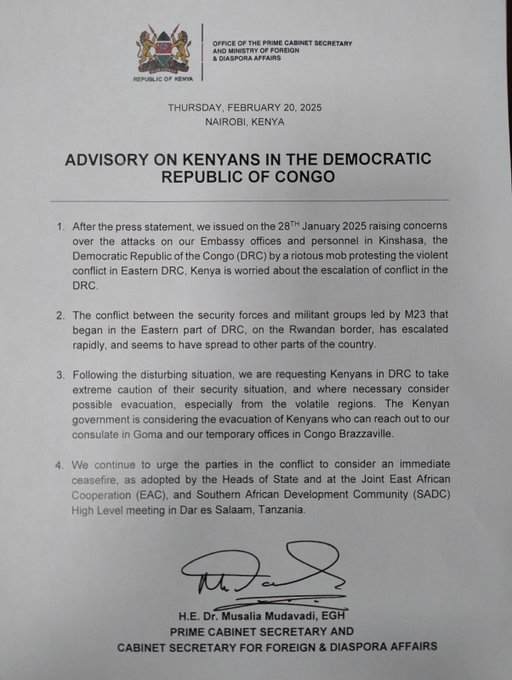Nairobi, Kenya – Kenya has recommended that its citizens residing in the Democratic Republic of Congo (DRC) take extra caution following the ongoing conflict in the eastern part of the country.
In a detailed statement, Musalia Mudavadi, Prime Cabinet Secretary and Cabinet Secretary for Foreign and Diaspora Affairs, urged Kenyans in DRC to take extreme caution regarding their security situation following the disturbing situation.
“Where necessary, consider possible evacuation, especially from the volatile regions. The Kenyan government is considering the evacuation of Kenyans who can reach out to our consulate in Goma and our temporary offices in Congo Brazzaville,” said Mudavadi.
Why Kenya was forced to issue a statement on the DRC war
On January 28, 2025, Nairobi issued a press statement raising concerns over the attacks on Kenya’s embassy offices and personnel in Kinshasa, DRC, by what Mudavadi termed a riotous mob protesting the violent conflict in Eastern DRC.
“Kenya is worried about the escalation of conflict in the DRC. The conflict between the security forces and militant groups led by M23 that began in the eastern part of DRC, on the Rwandan border, has escalated rapidly and seems to have spread to other parts of the country,” Mudavadi further said.
To try and find an amicable solution to the DRC crisis, regional leaders agreed to merge the Nairobi and Luanda peace processes.
The decision, made at the joint East African Community (EAC) and Southern African Development Community (SADC) summit recently, aimed to consolidate efforts and strengthen diplomatic engagement in the conflict-ridden region.
Advisory on Kenyans in the Democratic Republic of Congo.
The summit resolved to reinforce the two processes separately before integrating them to “enhance complementarity” while emphasising that direct negotiations between Kinshasa, M23 rebels, and other non-state actors must resume within the merged framework.
What Kenya thinks about the DRC conflict
President William Ruto, the EAC chairperson, underscored the need for a diplomatic rather than a military solution, calling for a “comprehensive approach” that tackles the root causes of the conflict while safeguarding the DRC’s territorial integrity and sovereignty.
“We must resist the temptation to think we can somehow shoot and bombard our way into a solution to such a complex situation,” Ruto said in his opening remarks. “Instead, we have to agree that only a comprehensive, diplomatic approach will lead to lasting peace.”
Ruto proposed a “fused, single, and coherent initiative” to address the crisis, warning against parallel efforts that could dilute progress or create unnecessary competition among regional peace efforts.
Meanwhile, Mudavadi disclosed that Nairobi continues to urge the parties in the conflict to consider an immediate ceasefire, as adopted by the Heads of State and at the joint EAC and SADC High-Level meeting in Dar es Salaam, Tanzania.




